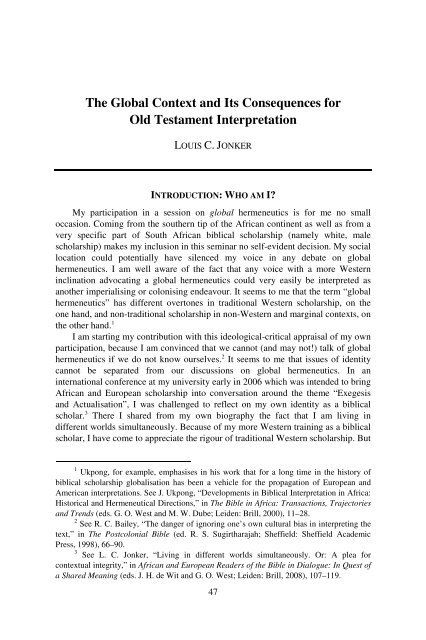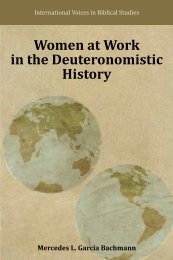Global Hermeneutics? - International Voices in Biblical Studies ...
Global Hermeneutics? - International Voices in Biblical Studies ...
Global Hermeneutics? - International Voices in Biblical Studies ...
Create successful ePaper yourself
Turn your PDF publications into a flip-book with our unique Google optimized e-Paper software.
The <strong>Global</strong> Context and Its Consequences for<br />
Old Testament Interpretation<br />
LOUIS C. JONKER<br />
INTRODUCTION: WHO AM I?<br />
My participation <strong>in</strong> a session on global hermeneutics is for me no small<br />
occasion. Com<strong>in</strong>g from the southern tip of the African cont<strong>in</strong>ent as well as from a<br />
very specific part of South African biblical scholarship (namely white, male<br />
scholarship) makes my <strong>in</strong>clusion <strong>in</strong> this sem<strong>in</strong>ar no self-evident decision. My social<br />
location could potentially have silenced my voice <strong>in</strong> any debate on global<br />
hermeneutics. I am well aware of the fact that any voice with a more Western<br />
<strong>in</strong>cl<strong>in</strong>ation advocat<strong>in</strong>g a global hermeneutics could very easily be <strong>in</strong>terpreted as<br />
another imperialis<strong>in</strong>g or colonis<strong>in</strong>g endeavour. It seems to me that the term “global<br />
hermeneutics” has different overtones <strong>in</strong> traditional Western scholarship, on the<br />
one hand, and non-traditional scholarship <strong>in</strong> non-Western and marg<strong>in</strong>al contexts, on<br />
the other hand. 1<br />
I am start<strong>in</strong>g my contribution with this ideological-critical appraisal of my own<br />
participation, because I am conv<strong>in</strong>ced that we cannot (and may not!) talk of global<br />
hermeneutics if we do not know ourselves. 2 It seems to me that issues of identity<br />
cannot be separated from our discussions on global hermeneutics. In an<br />
<strong>in</strong>ternational conference at my university early <strong>in</strong> 2006 which was <strong>in</strong>tended to br<strong>in</strong>g<br />
African and European scholarship <strong>in</strong>to conversation around the theme “Exegesis<br />
and Actualisation”, I was challenged to reflect on my own identity as a biblical<br />
scholar. 3 There I shared from my own biography the fact that I am liv<strong>in</strong>g <strong>in</strong><br />
different worlds simultaneously. Because of my more Western tra<strong>in</strong><strong>in</strong>g as a biblical<br />
scholar, I have come to appreciate the rigour of traditional Western scholarship. But<br />
1 Ukpong, for example, emphasises <strong>in</strong> his work that for a long time <strong>in</strong> the history of<br />
biblical scholarship globalisation has been a vehicle for the propagation of European and<br />
American <strong>in</strong>terpretations. See J. Ukpong, “Developments <strong>in</strong> <strong>Biblical</strong> Interpretation <strong>in</strong> Africa:<br />
Historical and Hermeneutical Directions,” <strong>in</strong> The Bible <strong>in</strong> Africa: Transactions, Trajectories<br />
and Trends (eds. G. O. West and M. W. Dube; Leiden: Brill, 2000), 11–28.<br />
2 See R. C. Bailey, “The danger of ignor<strong>in</strong>g one’s own cultural bias <strong>in</strong> <strong>in</strong>terpret<strong>in</strong>g the<br />
text,” <strong>in</strong> The Postcolonial Bible (ed. R. S. Sugirtharajah; Sheffield: Sheffield Academic<br />
Press, 1998), 66–90.<br />
3 See L. C. Jonker, “Liv<strong>in</strong>g <strong>in</strong> different worlds simultaneously. Or: A plea for<br />
contextual <strong>in</strong>tegrity,” <strong>in</strong> African and European Readers of the Bible <strong>in</strong> Dialogue: In Quest of<br />
a Shared Mean<strong>in</strong>g (eds. J. H. de Wit and G. O. West; Leiden: Brill, 2008), 107–119.<br />
47




